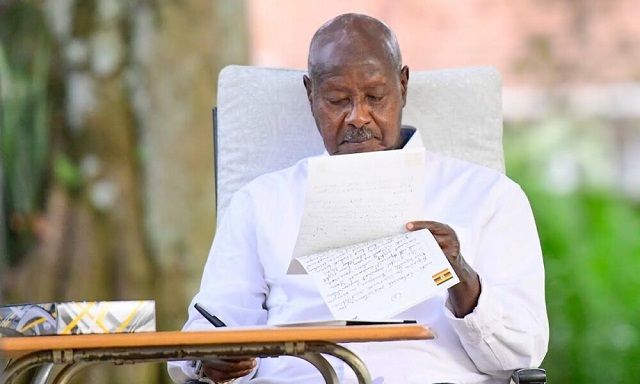
Museveni Faults Balaalo Over Land Misuse, Crop Destruction in Northern Uganda
Kampala, Uganda | THE INDEPENDENT | President Yoweri Museveni has condemned the disorderly conduct of some Balaalo pastoralists in Northern, Northwestern, and Eastern Uganda, citing key violations that include grazing livestock on people’s crops, illegal land occupation, and blocking access to public facilities like the Nile River.
In a strongly worded statement released Sunday, the President outlined a series of actions by the Balaalo that he said are causing tension and resentment among local communities. Chief among the concerns is “kwonesa,” a local term referring to cattle or livestock grazing on other people’s crops—a practice he said contradicts patriotism and undermines national unity.
Museveni noted that the destruction of crops stems largely from bringing cattle into areas without proper fencing, such as barbed wire or chain-link barriers. Even those who have fenced, he added, often lack permanent water sources on their farms, prompting them to move animals during the dry season and encroach on local farmlands.
He further accused some Balaalo of blocking community access routes to key public facilities, fencing carelessly, and, in some cases, occupying government ranches illegally—actions he said frustrate planned development projects such as cattle breeding.
“The Balaalo have even invaded government ranches,” Museveni said, warning that such moves not only obstruct government plans but provoke locals to demand similar access to the land.
The president questioned whether the pastoralists obtained proper cattle movement permits before entering the affected areas. He urged authorities who issue these permits to verify not only the health of the animals but also the suitability of the destination—checking for issues like water availability, fencing, and the potential for crop destruction.
He also dismissed allegations that his executive orders on this issue are tribalistic, insisting the orders target “illegal and irrational actors,” not law-abiding citizens. Museveni cited the example of Adyeeri, a Munyoro woman farming fruit in Nwoya District, who has been welcomed by the local community for her peaceful and lawful agricultural practices.
In addressing the legal ownership of land, Museveni stressed that even Balaalo who purchased land in the North do not have the right to destroy crops or block access routes. “Crops do not kwonesa other crops,” he said, contrasting the peaceful conduct of crop farmers with the disruptive practices of some pastoralists.
He added that while local communities also experience conflicts among themselves over grazing, they usually handle these through customary justice, such as tying up stray cattle and fining the owners — a system he said breaks down when some Balaalo arrive backed by armed relatives in the military.
“It is such arrogance and lawlessness that requires the intervention of the President through an Executive Order,” Museveni stated. The statement comes amid growing outcry in northern Uganda, where community leaders have repeatedly raised concerns about encroachment, land grabbing, and destruction of livelihoods by itinerant herders.

****
FULL LETTER
Fellow Ugandans, especially the Bazzukulu.
Greetings. My social-media manager has drawn my attention to the lies and distortions on social media about the issue of the Balaalo in Northern, Northwestern, and Eastern Uganda. The mistakes by the Balaalo in those areas are the following:
1. Okwonesa (cattle or other livestock, grazing on other People’s crops). Is that part of patriotism of a United Uganda? Is that part of the freedom of Movement of Ugandans within Uganda?
2. That kwonesa (livestock eating People’s crops), comes from introducing cattle in an area where there is no senge-nge (barbed wire)-good barbed wires or even chain links (obutiimba) to deal with the goats.
3. Even those who may have fenced, they may not have permanent water sources on the farm (bought or rented). Hence, in the dry season, they move out to look for water and, hence, kwonera People (livestock eating People’s crops).
4. Then, there is fencing carelessly by blocking People’s routes to the Nile River or other Public
5. The issue of non-Acholi’s or Northerners, legally owning land in the North comes in last. It is this one that should involve the lawyers. Which land did you, the Mulaalo, buy or rent? Was it Communal land fraudulently sold or rented by a few People or was it private land? The
7. Did these Balaalo get legal Cattle Movement permits, in the first place? This is ebaruha y’okufuruka (Movement Permit). The givers of these permits should always ensure that there are no problems (diseases, ownership, etc.) where the Cattle are coming from and no problems
9. Northerners, also kwoneseza one another (livestock eating crops). However, I hear, that for them, they have their local practices, which are also common in other areas, where you kutsibika (tying) the offending cow until the owner comes to redeem it and pays a fine. However, apparently, these justice measures cannot be followed by some of the arrogant Balaalo who will come with their armed relatives from the Army and, therefore, these simple justice practices cannot apply to such powerful People. That is why they need the Executive Order of the President of Uganda.
Signed:
Yoweri K. Museveni
Ssaabalwanyi
 The Independent Uganda: You get the Truth we Pay the Price
The Independent Uganda: You get the Truth we Pay the Price





